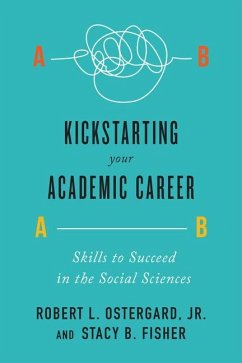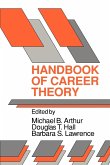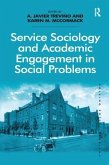Robert L Ostergard Jr, Stacy B Fisher
Kickstarting Your Academic Career
Skills to Succeed in the Social Sciences
29,99 €
inkl. MwSt.
Versandfertig in über 4 Wochen

15 °P sammeln
Robert L Ostergard Jr, Stacy B Fisher
Kickstarting Your Academic Career
Skills to Succeed in the Social Sciences
- Broschiertes Buch
- Merkliste
- Auf die Merkliste
- Bewerten Bewerten
- Teilen
- Produkt teilen
- Produkterinnerung
- Produkterinnerung
Kickstarting Your Academic Career is a primer on the common scholastic demands that social sciences students face upon entering college or university.
Andere Kunden interessierten sich auch für
![Academic Outsider Academic Outsider]() Victoria ReyesAcademic Outsider15,99 €
Victoria ReyesAcademic Outsider15,99 €![Handbook of Career Theory Handbook of Career Theory]() B. Arthur / T. Hall / S. Lawrence (eds.)Handbook of Career Theory122,99 €
B. Arthur / T. Hall / S. Lawrence (eds.)Handbook of Career Theory122,99 €![Academic Capitalism Academic Capitalism]() Richard MünchAcademic Capitalism64,99 €
Richard MünchAcademic Capitalism64,99 €![Life's Career-Aging Life's Career-Aging]() Barbara G. Myerhoff / Andrei Simic (eds.)Life's Career-Aging159,99 €
Barbara G. Myerhoff / Andrei Simic (eds.)Life's Career-Aging159,99 €![Service Sociology and Academic Engagement in Social Problems Service Sociology and Academic Engagement in Social Problems]() A. Javier TreviñoService Sociology and Academic Engagement in Social Problems80,99 €
A. Javier TreviñoService Sociology and Academic Engagement in Social Problems80,99 €![Boredom and Academic Work Boredom and Academic Work]() Mariusz FinkielszteinBoredom and Academic Work60,99 €
Mariusz FinkielszteinBoredom and Academic Work60,99 €![Universities and Academic Labour in Times of Digitalisation and Precarisation Universities and Academic Labour in Times of Digitalisation and Precarisation]() Thomas AllmerUniversities and Academic Labour in Times of Digitalisation and Precarisation63,99 €
Thomas AllmerUniversities and Academic Labour in Times of Digitalisation and Precarisation63,99 €-
-
-
Kickstarting Your Academic Career is a primer on the common scholastic demands that social sciences students face upon entering college or university.
Hinweis: Dieser Artikel kann nur an eine deutsche Lieferadresse ausgeliefert werden.
Hinweis: Dieser Artikel kann nur an eine deutsche Lieferadresse ausgeliefert werden.
Produktdetails
- Produktdetails
- Verlag: University of Toronto Press
- Seitenzahl: 144
- Erscheinungstermin: 10. Februar 2017
- Englisch
- Abmessung: 213mm x 137mm x 13mm
- Gewicht: 227g
- ISBN-13: 9781442635616
- ISBN-10: 1442635614
- Artikelnr.: 46969304
- Herstellerkennzeichnung
- Libri GmbH
- Europaallee 1
- 36244 Bad Hersfeld
- gpsr@libri.de
- Verlag: University of Toronto Press
- Seitenzahl: 144
- Erscheinungstermin: 10. Februar 2017
- Englisch
- Abmessung: 213mm x 137mm x 13mm
- Gewicht: 227g
- ISBN-13: 9781442635616
- ISBN-10: 1442635614
- Artikelnr.: 46969304
- Herstellerkennzeichnung
- Libri GmbH
- Europaallee 1
- 36244 Bad Hersfeld
- gpsr@libri.de
Robert L. Ostergard, Jr. is Associate Professor in the Department of Political Science at the University of Nevada, Reno.
Acknowledgments
Introduction
Why Am I Here? From High School to College or University
How to Use This Book for Students
How to Use This Book for Professors
1. Where to Start? The Basics of the Classroom
What to Expect from This Chapter
The Syllabus-The Rules of the Game
Course Management Systems
Professional Etiquette with Your Professor and Teaching Assistants
Course Information in the Syllabus
Large Class Dynamics
Strengths and Weaknesses of Large Classes
What to Expect in a Large Class
Large Lecture Hall Etiquette
Professors, Assistants, and the Large Lectures
Students and the Large Lecture Hall
Smaller Classes and Tutorials, Sections, or Labs
What to Expect in a Small Class
Course Discussions and Participation
Guidelines for Good Discussion
Revisiting the Lecture
Important Points to Remember
How to Succeed in College Courses
In a Large Class
In a Small Class
2. So You Thought You Knew How to Read? Readings and Notes for Class
Textbooks
How Often to Read
How to Read and Take Notes from a Textbook
Steps to Studying a Textbook
Supplemental Texts and Journal Articles
Note Taking in Classes
Preparing to Take Notes
What Am I Supposed to Write Down?
How Am I Supposed to Write It Down?
Important Points to Remember
Textbooks
Taking Notes in Class
3. On the Midterm Grind
The Professor Gave You a Study Guide-Lucky You! Or Not...
Study Groups
Types of Exams and Strategies for Each
Multiple Guess (Choice) Exams-Being Better than Chance
Identification and Short Answers
Essays-The Demon Spawn Rears Its Ugly Head
Getting Your Grade
Taking Charge of Your Education
Important Points to Remember
How to Succeed on Exams
Getting Your Grade
4. Finding Your Curiosity and Research Zen: Skills and the Projects That
Build Them
Finding Your Curiosity and Research Zen
Class Projects: Their Purposes and Some Helpful Suggestions
Research Projects
Summaries, Critiques, and Literature Reviews
Group Projects
Simulations and Virtual Experiences
Posters
Oral Presentations
Important Points to Remember
5. Can You Google That?
Where to Find Information
Finding Data
How to (and How Not to) Find Information
Can You Google That?
How Authoritative Are Your Sources?
What to Do with Your Information: Writing, Organizing, and Common Mistakes
Multitasking: Something We Are Horrible at Doing
Extracting Information
Bibliographic Software
Suggestions for Avoiding Plagiarism
Outlining a Plan for Your Writing
Writing Your Project
Editing Your Project
Research and Crunch Time
Important Points to Remember
Index
Introduction
Why Am I Here? From High School to College or University
How to Use This Book for Students
How to Use This Book for Professors
1. Where to Start? The Basics of the Classroom
What to Expect from This Chapter
The Syllabus-The Rules of the Game
Course Management Systems
Professional Etiquette with Your Professor and Teaching Assistants
Course Information in the Syllabus
Large Class Dynamics
Strengths and Weaknesses of Large Classes
What to Expect in a Large Class
Large Lecture Hall Etiquette
Professors, Assistants, and the Large Lectures
Students and the Large Lecture Hall
Smaller Classes and Tutorials, Sections, or Labs
What to Expect in a Small Class
Course Discussions and Participation
Guidelines for Good Discussion
Revisiting the Lecture
Important Points to Remember
How to Succeed in College Courses
In a Large Class
In a Small Class
2. So You Thought You Knew How to Read? Readings and Notes for Class
Textbooks
How Often to Read
How to Read and Take Notes from a Textbook
Steps to Studying a Textbook
Supplemental Texts and Journal Articles
Note Taking in Classes
Preparing to Take Notes
What Am I Supposed to Write Down?
How Am I Supposed to Write It Down?
Important Points to Remember
Textbooks
Taking Notes in Class
3. On the Midterm Grind
The Professor Gave You a Study Guide-Lucky You! Or Not...
Study Groups
Types of Exams and Strategies for Each
Multiple Guess (Choice) Exams-Being Better than Chance
Identification and Short Answers
Essays-The Demon Spawn Rears Its Ugly Head
Getting Your Grade
Taking Charge of Your Education
Important Points to Remember
How to Succeed on Exams
Getting Your Grade
4. Finding Your Curiosity and Research Zen: Skills and the Projects That
Build Them
Finding Your Curiosity and Research Zen
Class Projects: Their Purposes and Some Helpful Suggestions
Research Projects
Summaries, Critiques, and Literature Reviews
Group Projects
Simulations and Virtual Experiences
Posters
Oral Presentations
Important Points to Remember
5. Can You Google That?
Where to Find Information
Finding Data
How to (and How Not to) Find Information
Can You Google That?
How Authoritative Are Your Sources?
What to Do with Your Information: Writing, Organizing, and Common Mistakes
Multitasking: Something We Are Horrible at Doing
Extracting Information
Bibliographic Software
Suggestions for Avoiding Plagiarism
Outlining a Plan for Your Writing
Writing Your Project
Editing Your Project
Research and Crunch Time
Important Points to Remember
Index
Acknowledgments
Introduction
Why Am I Here? From High School to College or University
How to Use This Book for Students
How to Use This Book for Professors
1. Where to Start? The Basics of the Classroom
What to Expect from This Chapter
The Syllabus-The Rules of the Game
Course Management Systems
Professional Etiquette with Your Professor and Teaching Assistants
Course Information in the Syllabus
Large Class Dynamics
Strengths and Weaknesses of Large Classes
What to Expect in a Large Class
Large Lecture Hall Etiquette
Professors, Assistants, and the Large Lectures
Students and the Large Lecture Hall
Smaller Classes and Tutorials, Sections, or Labs
What to Expect in a Small Class
Course Discussions and Participation
Guidelines for Good Discussion
Revisiting the Lecture
Important Points to Remember
How to Succeed in College Courses
In a Large Class
In a Small Class
2. So You Thought You Knew How to Read? Readings and Notes for Class
Textbooks
How Often to Read
How to Read and Take Notes from a Textbook
Steps to Studying a Textbook
Supplemental Texts and Journal Articles
Note Taking in Classes
Preparing to Take Notes
What Am I Supposed to Write Down?
How Am I Supposed to Write It Down?
Important Points to Remember
Textbooks
Taking Notes in Class
3. On the Midterm Grind
The Professor Gave You a Study Guide-Lucky You! Or Not...
Study Groups
Types of Exams and Strategies for Each
Multiple Guess (Choice) Exams-Being Better than Chance
Identification and Short Answers
Essays-The Demon Spawn Rears Its Ugly Head
Getting Your Grade
Taking Charge of Your Education
Important Points to Remember
How to Succeed on Exams
Getting Your Grade
4. Finding Your Curiosity and Research Zen: Skills and the Projects That
Build Them
Finding Your Curiosity and Research Zen
Class Projects: Their Purposes and Some Helpful Suggestions
Research Projects
Summaries, Critiques, and Literature Reviews
Group Projects
Simulations and Virtual Experiences
Posters
Oral Presentations
Important Points to Remember
5. Can You Google That?
Where to Find Information
Finding Data
How to (and How Not to) Find Information
Can You Google That?
How Authoritative Are Your Sources?
What to Do with Your Information: Writing, Organizing, and Common Mistakes
Multitasking: Something We Are Horrible at Doing
Extracting Information
Bibliographic Software
Suggestions for Avoiding Plagiarism
Outlining a Plan for Your Writing
Writing Your Project
Editing Your Project
Research and Crunch Time
Important Points to Remember
Index
Introduction
Why Am I Here? From High School to College or University
How to Use This Book for Students
How to Use This Book for Professors
1. Where to Start? The Basics of the Classroom
What to Expect from This Chapter
The Syllabus-The Rules of the Game
Course Management Systems
Professional Etiquette with Your Professor and Teaching Assistants
Course Information in the Syllabus
Large Class Dynamics
Strengths and Weaknesses of Large Classes
What to Expect in a Large Class
Large Lecture Hall Etiquette
Professors, Assistants, and the Large Lectures
Students and the Large Lecture Hall
Smaller Classes and Tutorials, Sections, or Labs
What to Expect in a Small Class
Course Discussions and Participation
Guidelines for Good Discussion
Revisiting the Lecture
Important Points to Remember
How to Succeed in College Courses
In a Large Class
In a Small Class
2. So You Thought You Knew How to Read? Readings and Notes for Class
Textbooks
How Often to Read
How to Read and Take Notes from a Textbook
Steps to Studying a Textbook
Supplemental Texts and Journal Articles
Note Taking in Classes
Preparing to Take Notes
What Am I Supposed to Write Down?
How Am I Supposed to Write It Down?
Important Points to Remember
Textbooks
Taking Notes in Class
3. On the Midterm Grind
The Professor Gave You a Study Guide-Lucky You! Or Not...
Study Groups
Types of Exams and Strategies for Each
Multiple Guess (Choice) Exams-Being Better than Chance
Identification and Short Answers
Essays-The Demon Spawn Rears Its Ugly Head
Getting Your Grade
Taking Charge of Your Education
Important Points to Remember
How to Succeed on Exams
Getting Your Grade
4. Finding Your Curiosity and Research Zen: Skills and the Projects That
Build Them
Finding Your Curiosity and Research Zen
Class Projects: Their Purposes and Some Helpful Suggestions
Research Projects
Summaries, Critiques, and Literature Reviews
Group Projects
Simulations and Virtual Experiences
Posters
Oral Presentations
Important Points to Remember
5. Can You Google That?
Where to Find Information
Finding Data
How to (and How Not to) Find Information
Can You Google That?
How Authoritative Are Your Sources?
What to Do with Your Information: Writing, Organizing, and Common Mistakes
Multitasking: Something We Are Horrible at Doing
Extracting Information
Bibliographic Software
Suggestions for Avoiding Plagiarism
Outlining a Plan for Your Writing
Writing Your Project
Editing Your Project
Research and Crunch Time
Important Points to Remember
Index







